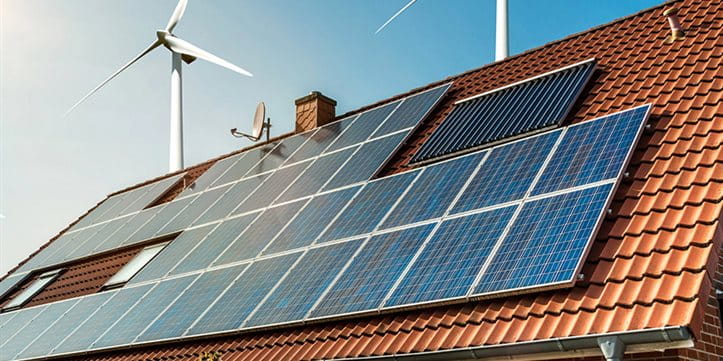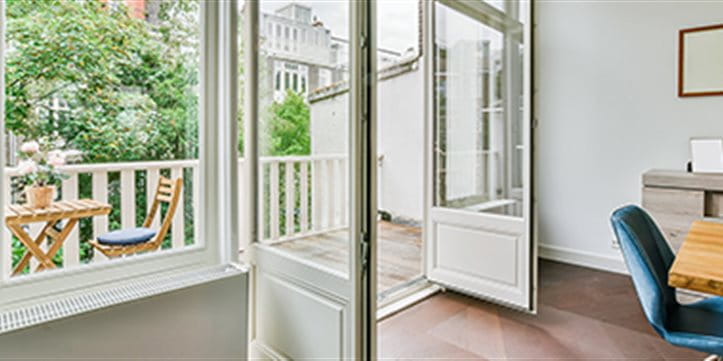Climate: How well suited to solar power is my region?
Switzerland is not particularly known for its sunny weather. But solar radiation in Sion (VS) or Samedan (GR) is comparable with that in Tuscany. Nor does cold weather damage solar panels. Electricity production may be lower in fog and snow, but it is never zero.
- A website of the Swiss Federal Office of Energy calculates individual suitability for every property and provides answers to these questions:
- Is the roof suitable for solar power or solar heat?
- How much of a yield might the roof area generate in theory?
What is the next step?
System: Which technology for my needs?
Photovoltaic cells convert electromagnetic radiation into power. Solar heating systems, by contrast, consist of solar collectors with thermal energy storage. They produce hot water and support the heating system. An overview of the different technologies is provided, for example, by Swissolar, the Swiss Solar Energy Professionals Association.
Calculate your requirements:
- Is hot water preparation and energy for heating enough?
- Should the solar energy system also generate power?
Building: Are the circumstances favorable?
A solar energy system has a lifespan of around 30 years. The building should also remain in good condition for this length of time. Choose solar energy if:
- The building is already in a good general condition
- Thermal and general insulation is already in place
- There is sufficient space for collectors
- Conversion or renovation is planned anyway
The cantonal experts from GEAK can provide tips on the quality of the building shell and energy-efficient renovation.
Location: What are the rules in my municipality?
The "cantonal viewpoint" may even be broken down into a "village viewpoint": Rules for solar energy systems vary depending on the municipality. Solar energy systems do not require a building permit everywhere, but they should always be reported to the municipality in advance. Get in touch with the local authorities early enough to clarify the situation with respect to:
- Building regulations
- Standards for building and electrical requirements
- Fire protection regulations
- Opportunity for funding contributions
Network operators: How generous is the compensation?
The terms offered by your network operator will have a considerable impact on how quickly – and in some cases whether – purchasing the system will pay off. One sample calculation from the recently published study by ETH and the University of Bern on the profitability of solar energy systems: In Rümlang in the canton of Zurich, a 12 kW system on a single-family home will generate a return of 6% over 30 years. In neighboring Kloten, a similar system will return a slight loss. The decisive factor, alongside the purchase price, is the remuneration for feed-ins. In 2022 the rate in Rümlang was 16.97 centimes/kWh; in Kloten it was just 6.10 centimes/kWh. Ask your network operator about:
- Electricity purchase costs per kWh
- Feed-in remuneration per kWh
Power supply stability: Is it guaranteed?
Natural resources like wind, water and the sun fluctuate. Thanks to more and more accurate weather forecasts, power production can be successfully estimated in advance. In addition, you can ensure greater energy supply stability by:
- Combining solar power with geothermal energy, in other words a heat pump or geothermal heat
- Further enhancing your energy autonomy with a battery storage system.
Costs: How much do I need to invest?
Photovoltaic systems are not primarily about an autonomous supply of power. They are – at best in combination with a battery storage system – a supplement to reduce the amount of external power purchased. Prices for solar energy systems have been falling sharply for years. At the same time, modules are now more efficient and fewer panels are needed. In addition, state discounts and tax return deductions are available. Clarify your specific requirements by:
- Comparing different providers
- Comparing different module systems and models
- Estimating the number of modules and their size
- Considering the use of a battery storage system However, these are – still – costly
- Clarifying the conditions for grants from the Confederation, cantons and municipalities
Example
A photovoltaic system measuring 30 m² for a single-family home costs around CHF 15,000. The Confederation will pay a one-off grant, currently CHF 2,600. The tax deduction amounts to some CHF 2,900. Acquisition costs of CHF 9,500 remain.
(Source: SENS Recycling)
Profitability: Can I make money with electricity?
The network operator at your location is crucial.
- In 2022, power providers paid between 5 and 22 centimes per kWh for feed-ins.
- They sold one kilowatt hour of power for 12 to 34 centimes.
- According to the study by ETH and the University of Bern on the profitability of solar energy systems, a system is considered profitable if the expected profit is greater than 3 percent over a lifespan of 30 years.
- Almost half of all single-family homes would profit from a photovoltaic system or heat pump.
- On larger roofs like factories and multi-family dwellings, solar collectors nearly always pay off.
Under Energie Schweiz, the Swiss Federal Office of Energy provides various online tools that enable you to calculate the individual costs and benefits of a solar energy system.
Life cycle assessment: Solar energy really is environmentally friendly
Too expensive, inefficient and ugly: Solar modules had a bad image for a long time. Unfairly so. Nowadays they are cheaper, more efficient – and nicer to look at.
Panels
The production, transport, installation and recycling of panels require energy. Modern systems offset this within two to three years. From then, a solar energy system delivers net renewable energy for the rest of its lifespan of around 30 years.
Raw material consumption
Photovoltaic systems consist mainly of glass, plastics and aluminum. These raw materials are recyclable, and shortages are not to be feared even in the event of a huge increase in demand. Aluminum and glass can be melted down and reused in an endless cycle without any loss of quality.
Pros and cons of solar energy
Advantages
Environmentally friendly
Degree of power autonomy
Reduction in power costs
Reduction in the need for fossil fuels
No noise or waste gas emissions
Low maintenance requirements
No land use if installed on buildings
Disadvantages
Acquisition costs
Power production limited in winter
Need for space
Legal conditions differ from location to location






